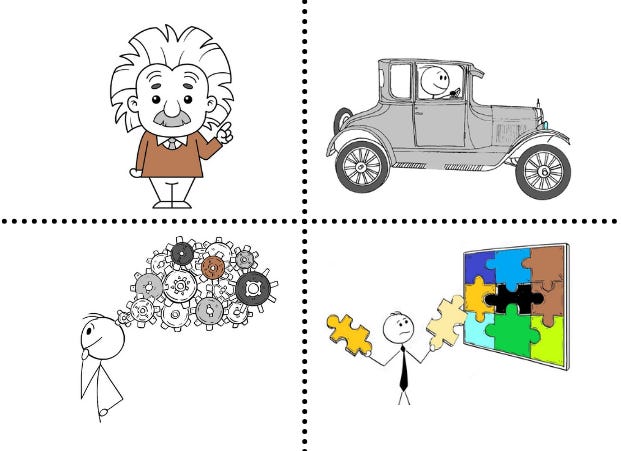Happy Thursday, 👋
When people consider starting a business, a natural instinct is to rely on their personal industry experience or knowledge to solve industry-specific problems. However, history consistently demonstrates that breakthrough innovations emerge when we divide complex challenges into smaller components and seek inspiration from entirely unrelated industries. This approach, often referred to as novel framing or precedents thinking, can unlock powerful economic gains, become the foundation for successful companies, and drive industry inflection points.
Framing the Problem: Lessons from Einstein
Albert Einstein, in "The Evolution of Physics," emphasizes the importance of properly formulating a problem and evaluating it from new perspectives:
The formulation of a problem is often more essential than its solution, which may be merely a matter of mathematical or experimental skill. To raise new questions, new possibilities, to regard old problems from a new angle, requires creative imagination and marks real advance in science.
This principle applies directly to the journey of most founders. Successful startups frequently succeed not by inventing entirely new concepts, but instead by creatively recombining existing ideas from different industries.
Henry Ford and the Automotive Revolution
Henry Ford is credited with revolutionizing automotive manufacturing. However, his initial goal was not financial success but instead making cars affordable for everyday Americans. He did it by breaking his broad goal into smaller problems: production efficiency, speed of assembly, and worker motivation. The automotive assembly line was adapted from the streamlined, efficient methods of slaughterhouses, where each worker specialized in a single task along a moving conveyor belt. The choice to have one color (black) resulted from Ford noticing bicycle factories used black lacquer because it dried faster than other paints, speeding up the overall production process. Furthermore, Ford’s progressive profit-sharing incentives were inspired by Procter & Gamble’s employee engagement model, designed to motivate workers by aligning their success with that of the company.
Rather than limiting himself to looking within the automotive industry for solutions, Ford blended insights from multiple industries, changing how he put together the puzzle pieces and revolutionized an industry not by invention but through recombination.
The Netflix Model
Similarly, Reed Hastings disrupted the video rental industry through a innovative approach due to personal frustration. After incurring significant late fees from overdue movie rentals at Blockbuster, Hastings reflected on alternative business models during a drive to his gym.
He realized gyms charged a consistent membership fee regardless of how frequently members visited, effectively eliminating penalty-based charges. This inspired Hastings to apply the gym membership concept to movie rentals, fundamentally altering customer experience and expectations. He further optimized Netflix’s model by borrowing ideas from Amazon’s warehouse logistics. Like Ford, Hastings innovated an entire industry by recombining existing ideas from various industries.
Precedents Thinking for Startups
The problem-solving approach Einstein advocated, embraced by Ford, Hastings, and numerous startups, is known as precedents thinking. This method involves breaking down complex problems into smaller, manageable challenges, then seeking external ideas or inspiration for each component.
Adopting precedents thinking requires intentional neutrality and openness, crucial to fostering innovation. Founders must consciously resist the urge to dismiss potential solutions simply because they seem unrelated or unconventional within their industry context. By remaining open-minded and agnostic about the origins of ideas, founders enhance their ability to uncover transformative, innovative solutions that might otherwise be overlooked.
Building Diverse Networks for Innovation
Many founders we encounter have strong networks narrowly focused within their industry. We consistently encourage them to broaden their connections and engage individuals from diverse fields. This broader engagement can yield fresh perspectives and unconventional solutions that traditional industry-focused networks might overlook.
Einstein described a related concept called “combinatory play”, the creative combination of unrelated ideas, insights, or concepts to discover unique solutions. He believed the mind excels at problem-solving when allowed the freedom to experiment broadly and consider unrelated sources of information.
Final Thoughts: Redefining Challenges, Reshaping Industries
Ultimately, the most successful startups redefine and transform entire industries. By embracing precedents thinking and combinatory play, founders systematically deconstruct complex challenges, explore diverse industries for inspiration, and creatively recombine these insights into impactful solutions.
Every industry has its share of challenges, yet the boldest innovations often surface from the least expected places. Entrepreneurs who venture beyond familiar territory and combine insights from diverse industries become trailblazers, creating industry inflection points and unlocking powerful solutions from unexpected connections.
Wishing everyone a great weekend,
-Eric.





